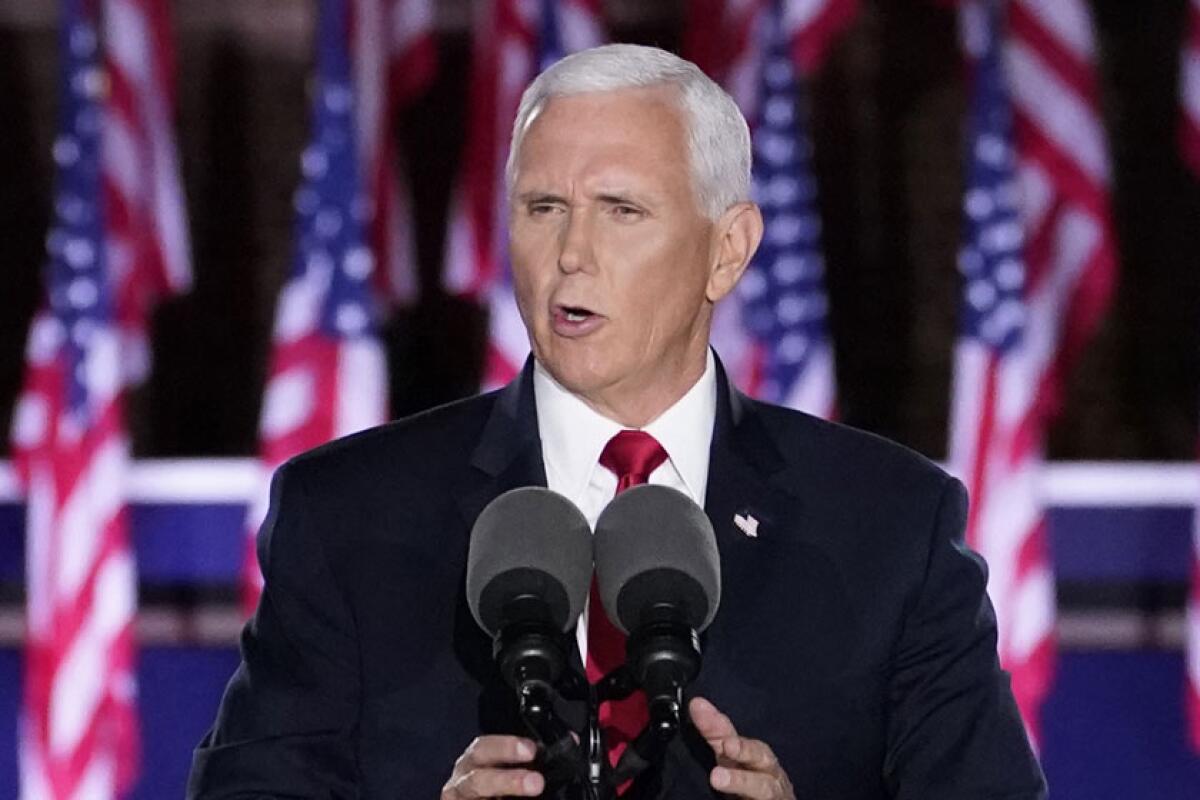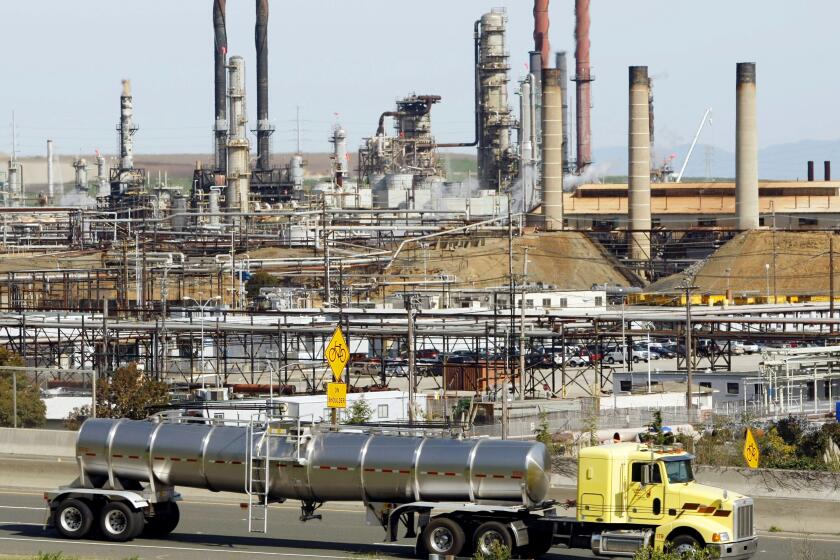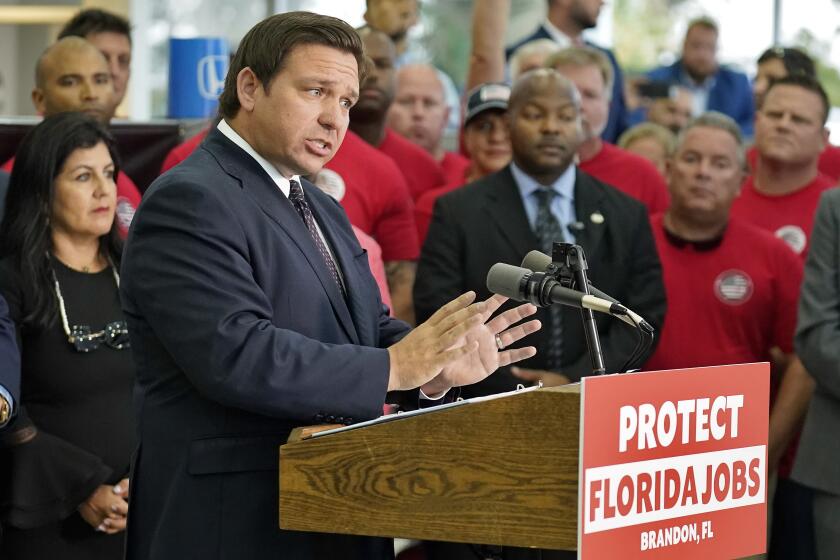Column: The GOP is now complaining about environmentally responsible investing

- Share via
In May, Elon Musk went on the warpath against the investment model known by the initials ESG, short for “environmental, social and governance” principles.
“ESG is a scam,” Musk, the chief executive of electric-car maker Tesla, groused in a tweet. “It has been weaponized by phony social justice warriors.”
Musk was irked that Tesla had been dropped from a Standard & Poor’s ESG index while oil company Exxon Mobil remained. But his complaint tied in neatly with a campaign being waged by political conservatives against ESG, or, as they sometimes describe it, “woke capitalism.”
Climate risk is investment risk.
— BlackRock CEO Larry Fink, 2020
Red states have been implementing policies aimed at taking business away from investment managers whose strategies ostensibly promote environmental goals or social activism — say, by shunning investments in fossil fuel or firearms companies or in companies with questionable social practices.
Former Vice President Mike Pence placed the battle against ESG front and center in his quest for the GOP presidential nomination in 2024. During a speech in Houston in May, Pence attacked the Biden administration for advancing “capricious new ESG regulations that allow left-wing radicals to destroy American energy producers from within.”
Get the latest from Michael Hiltzik
Commentary on economics and more from a Pulitzer Prize winner.
You may occasionally receive promotional content from the Los Angeles Times.
Pence’s words surely fell on welcoming ears in Houston, since ESG investing commonly targets the oil and gas industry and the fossil fuel economy. For example, the American Legislative Exchange Council, a right-wing organization partly funded by the Koch network, which derives much of its wealth from fossil fuels, has promoted a model anti-ESG law.
A Texas law passed last year prohibits state agencies from investing or doing business with financial firms deemed to “boycott” fossil fuel companies by “taking any action ... intended to penalize, inflict economic harm on, or limit commercial relations” with those companies.
Texas State Comptroller Glenn Hegar has already begun compiling a list of boycotting firms by asking them to disclose their policies on global warming.
In June, West Virginia State Treasurer Riley Moore informed six leading Wall Street firms by letter that they had been provisionally found to be boycotting fossil fuel companies, possibly making them ineligible for state contracts. The firms are BlackRock, Goldman Sachs, JPMorgan Chase, Wells Fargo, U.S. Bancorp and Morgan Stanley.
Manchin, other fossil fuel shills torpedoed the nomination of banking regulator Sarah Bloom Raskin because she wants to fight climate change
Goldman Sachs and U.S. Bancorp declined my request for comment. BlackRock hasn’t commented publicly. JPMorgan told me it hasn’t yet responded to Moore; the deadline for responding is July 10. The other two didn’t reply.
BlackRock, one of the world’s largest investment management firms, has become a particular target for the anti-ESG crowd. In part that’s because BlackRock CEO Larry Fink sounded an early alarm about the investment impact of global warming in his annual letter to corporate CEOs in 2020. “Climate risk is investment risk,” Fink wrote then.
This year, Fink noted that “every company and every industry will be transformed by the transition to a net zero world” (that is, reducing the emission of greenhouse gases to zero). He added, “The question is, will you lead, or will you be led?”
In response, West Virginia’s Moore announced that his state would withdraw about $20 million in funds from BlackRock management, out of its $8 billion in Treasury investments. BlackRock also manages about $8 billion for the state’s pension fund, which isn’t subject to the treasurer’s action.
Still, the pushback by states doesn’t precisely match the weight of the oil and gas industry within their borders.
You don’t see legislation penalizing banks or investment funds for shunning oil and gas companies coming out of blue California, which ranks second in the nation in most measures of oil and gas economic activity, according to the American Petroleum Institute, or Pennsylvania (third to fifth, depending on the metric), or other top-10 states such as New York, New Jersey and Illinois.
You see them in red states such as Texas, Kentucky and Tennessee. Texas ranks first in the nation in oil and gas activity, but the other two aren’t even among the top 15.
In Tennessee, which enacted a law forbidding the state treasurer to do business with a financial institution that refuses to finance companies in the fossil fuel industry, the oil and gas industry accounts for about 4% of employment in the state.
Corporations of all kinds are getting an earful from shareholders and the SEC about the need to disclose climate change impacts.
That’s a sign that ESG has become an all-purpose rallying cry in the partisan culture wars. For Republicans and the right wing, ESG is the new “critical race theory.” It’s a concept nebulous enough to be made to seem offensive or evil.
The term itself can be weaponized as a catchphrase to rile up the base; insofar as the base has no idea what it even means, so much the better. (Not even the most hidebound anti-CRT flag-carriers can explain what CRT is.)
It’s worth noting that state-level attacks on financial companies over their purported favoring of ESG issues, especially state laws aimed at protecting the oil and gas industry, can be expensive.
The 2021 Texas law prohibiting municipalities from dealing with banks that appeared to have pro-ESG policies led to the exit of five major municipal underwriters from the state, according to a study by Daniel Garrett of the University of Pennsylvania and Ivan Ivanov of the Federal Reserve.
They estimated that the interest costs for Texas municipalities on $32 billion in borrowing during the first eight months after the law’s enactment were higher by as much as $532 million.
Conservative attacks on ESG aren’t new. The Trump administration took aim at the concept in 2020, when the Department of Labor tried to limit the ability of retirement account managers to offer account holders options for socially responsible or sustainable investments. Another Trump initiative aimed to make it harder for those managers to vote in favor of shareholder resolutions promoting ESG goals.
The Biden administration dropped those rules in March.
This is merely another iteration of the campaign against “wokeness,” which seems to be the core of what some Republican officeholders and aspirants have to offer voters.
A good example is Florida Gov. Ron DeSantis, who has made Walt Disney Co., one of his state’s largest employers, a target of his theatrical wrath because it deigned to criticize Florida’s so-called Don’t Say Gay law, which discourages teaching in public schools about gender issues.
It’s easy to tar ESG as a left-wing, radical or fringe policy threatening sober, responsible corporate managements — never mind that it has been spreading through Wall Street faster than almost any other investing concept in recent memory.
With ESG investing now accounting for more than $20 trillion in assets under management in the U.S. alone, according to Bloomberg Intelligence, or more than one-third of the total assets, ESG is now unmistakably mainstream.
Disney’s money has controlled Florida politics for more than 50 years. Now the politicians are showing their ingratitude.
For all that, ESG can be a squishy concept in practice. Deutsche Bank has come under investigation by German authorities and Goldman Sachs by the Securities and Exchange Commission for allegedly pasting “ESG” labels on investment funds that may not be especially rigorous about focusing on legitimate ESG companies, a practice sometimes described as “greenwashing.”
The SEC has proposed rules to “promote consistent, comparable and reliable information for investors concerning funds’ and advisors’ incorporation of environmental, social, and governance factors.” Among other rules, the agency says, “funds focused on the consideration of environmental factors generally would be required to disclose the greenhouse gas emissions associated with their portfolio investments.”
The investigations and the SEC proposals imply that investment firms are trying to serve the public’s enthusiasm for socially responsible investing without doing the hard work of fashioning portfolios that meet the standard.
Defining what even qualifies as an ESG investment, however, isn’t easy. The investment world is engaged in a vigorous debate over whether fossil fuel companies should be excluded from ESG portfolios entirely, or whether it’s proper to invest in some companies that are trying to transition from petroleum to renewables but haven’t completed the journey.
Environmental and social issues often go hand in hand. Musk’s complaint about S&P’s ESG index overlooked the reason Tesla was dropped from the roster: According to S&P, it was because of issues related to accusations of racial discrimination at Tesla and questions about the safety of Tesla’s Autopilot driver-assist features.
In their own words, former Tesla employees describe what they call a racist work environment that led California to file a civil rights lawsuit against the company.
Exxon stayed on the list as an artifact of S&P’s complicated industry weighting process for the index, but didn’t represent S&P’s judgment that the oil company was a beacon of environmental responsibility.
Not all fossil fuel companies respond to ESG initiatives with unalloyed hostility — despite Pence’s assertion in his Houston speech that three directors elected to the board of Exxon Mobil on an ESG platform last year are “now working to undermine the company from the inside.”
In fact, Exxon Mobil has taken steps to placate ESG investors — not least because the three directors elected last year in the campaign sponsored by the sustainable investment firm Engine No. 1 were reelected this year. In a one-year retrospective, Engine No. 1 reported that since the original election, “Exxon has taken a multitude of actions to reduce its emissions footprint and has begun to lay the foundations for a viable low-carbon business strategy.”
These initiatives can be viewed as undermining fossil fuel companies only if one believes that the oil and gas industry will be immune into the limitless future from the consequences of global warming and the developed world’s transition to alternative energy. As ESG investors understand, that’s not the way to bet.
More to Read
Get the latest from Michael Hiltzik
Commentary on economics and more from a Pulitzer Prize winner.
You may occasionally receive promotional content from the Los Angeles Times.















